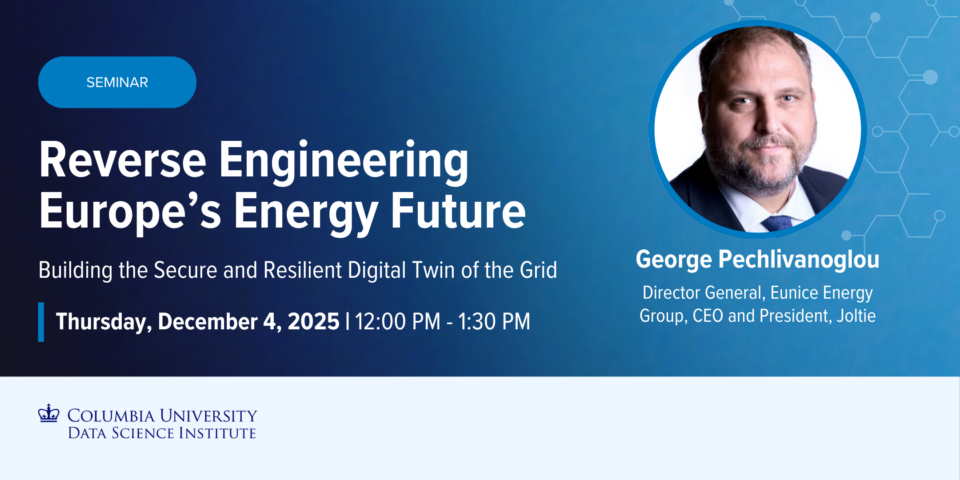DSI Smart Cities Seminar: George Pechlivanoglou
Thursday, December 4, 2025
12:00 pm - 1:30 pm


Hosted by the DSI Smart Cities Center

George Pechlivanoglou, Director General, Eunice Energy Group; and CEO and President, Joltie
Location: Northwest Corner Building – Armen Avanessians Conference Room – 14th Floor (DSI Suite) – 550 W 120th St, New York, NY 10027
Agenda:
Abstract: Europe’s energy transition has outpaced its digital transition. As renewable penetration rises and grid inertia vanishes, traditional models of forecasting and control collapse under the weight of nonlinear complexity. The European energy market, an intricate, data-rich ecosystem of zonal prices, balancing mechanisms, and infrastructural constraints, demands better data analytics.
This lecture presents a new frontier: the creation of a secure, full-scale digital twin of the European power system, capable of modeling the network itself. By unifying market dynamics with physics-based models of substations, transmission lines, and generation assets, the digital twin reconstructs and simulates the grid’s hidden state in near real time. This model extends beyond energy forecasting toward predictive energy economics and provides a framework to model not only how the grid behaves, but how it will behave under stress.
Modern grids face not only physical instability from renewables but systemic threats from cyberattacks, cascading failures, and coordinated disruptions. Within the digital twin, artificial damage simulations, including cyber-physical intrusion scenarios, enable testing of defense mechanisms, recovery strategies, and autonomous response models. By integrating telemetry, behavioral anomaly detection, and threat intelligence into the energy models, we can prototype techniques with broad applicability across the EU.
Eunice Energy Group provides a unique empirical base for this study by acting as an operational and asset-level data across the Mediterranean’s most dynamic and vulnerable systems. Greece stands as a living laboratory ideal for this type of study: a semi-isolated grid, high in renewable volatility, where resilience and cybersecurity are operational necessities.
The challenge to the data science community is to design the intelligence layer of Europe’s next-generation energy infrastructure through analysis and integration of modalities that have never been combined before with far-reaching individual benefit. Through causal inference, graph neural networks, hybrid AI–physics modeling, and adversarial resilience simulation, data previously restricted to an energy company’s internal frameworks can be unique opportunities for data scientists interested in green energy and climate change.